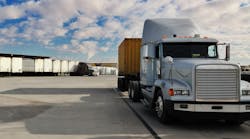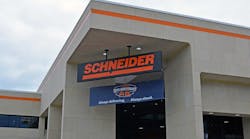It's official
It is now official from my perspective. There is a driver shortage. Until last month, I was not aware of any freight that was not moving as scheduled. Now I am. As an economist, my rules are rather simple: If all freight moves as required, there is no driver shortage.
That's not to say there was no driver imbalance or there was not a lack of drivers with a certain level of quality. That has been occurring for sometime, as can be seen from the sharp increase in driver wages over the past two years-with more to come.
General freight carriers had an average share of cost per mile for fuel of 6.1% in 1990 and 5.4% in 2001. For wages and benefits, the shares were 42.6% and 41.5%, respectively. The combined shares for 1990 were 48.7%, and for 2001, 46.9%.
That's not to say wage and fuel costs did not increase. But they did so a slower rate than other costs, due to labor productivity gains and/or cost differentials.
As posted, the cost shares did not change that much for over a decade. That allowed for reasonably consistent management approaches to both operations and customers.
But during the year 2002, there was dramatic change in the financial structure of the operations of all general freight carriers. Fuel cost shares declined slightly to 5.0%, but wage cost share rose dramatically to 50.7%. Overall, the combined shares rose to 55.7%.
During that year, there was no relief on other expenses, so the major disruption to operations was the wage level. Productivity gains were no longer able to make headway in staving off the impact of the wage increases needed to attract drivers.
The industry had to immediately focus on how to make freight handling more productive. The true answer is to make customers pay for the freight-handling services they require and that is happening more and more.
During 2003, the last year for which I have complete data, the wage share of expenses fell to 46.9%, the second highest share on record. Fuel managed to get the record at a share of 7.0%, creating a combined share of 53.9%.
But recall that 2003 also saw substantial increases in insurance costs and equipment prices. Thus, the combined share represents an even greater challenge for fleets to improve both labor and fuel productivity. We'll leave fuel productivity off the table for now and focus on what's become the most significant driver shortage issue to come our way.
As you read this, I hope your blood pressure does not go up over 140/80. Because if it does, you will have to forfeit your CDL, according to Federal Motor Carrier Safety Administration (FMCSA) regulations.
The regs say that as of October 1, 2004, any driver who does not have his or her blood pressure corrected to that level within a year will no longer be certified as physically fit to drive.
But police officers, fire fighters, EMTs, brain surgeons and FMCSA employees will all be able to continue to work as usual regardless of their blood-pressure levels.
Blood pressure naturally increases with age for many in the population. So not only will this rule reduce the available pool of drivers, it will do so by removing the most experienced drivers.
And I cannot imagine a driver, already fed up with the regulations, submitting to a drug treatment program that has side effects not conducive to driving.
One fleet executive I spoke with at the recent National Tank Truck Carriers Association conference in Chicago informed me that 20% of their drivers were “on the bubble.”
The result of this blood-pressure regulation will be more freight sitting on the docks.


